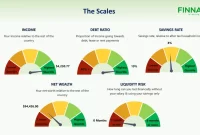Understanding Taxes: Simplifying Personal Finance
An Overview of Income Tax and Its Importance
Income tax is a type of tax that individuals and businesses are required to pay on their earnings. It is a crucial part of the taxation system in most countries around the world, including the United States. Understanding income tax and its importance is essential for managing personal finances effectively.
One of the primary reasons income tax is important is that it provides the government with the necessary funds to operate and provide public services. These services include education, healthcare, infrastructure development, defense, and more. Income tax revenue is used to support various social welfare programs and contribute to the overall economic growth of a country.
Additionally, income tax serves as a means of wealth redistribution. Progressive income tax systems, where higher-income individuals are taxed at a higher rate, aim to reduce income inequality and create a more balanced society. The revenue generated from higher-income earners can be used to support social programs that benefit the less fortunate.
Understanding income tax is vital for individuals as well. It helps individuals comply with the law and avoid legal consequences for non-payment or tax evasion. Knowing how to calculate and manage taxes allows individuals to effectively plan their finances, budget their expenses, and save for the future.
Moreover, being aware of income tax regulations and provisions can help individuals take advantage of available deductions and credits. These can significantly lower the amount of tax owed and increase disposable income. By maximizing deductions and credits, individuals can optimize their tax liabilities while still abiding by the tax laws.
In conclusion, income tax is an integral part of the taxation system and plays a significant role in supporting government services, promoting income equality, and aiding economic growth. Understanding its concepts and implications is crucial for both individuals and businesses to manage personal finances effectively and ensure compliance with the law.
Common Tax Deductions for Individuals
When it comes to understanding taxes and managing personal finance, knowing the common tax deductions available for individuals is crucial. These deductions can help reduce your taxable income, resulting in potential savings. Here are some of the most common tax deductions that individuals can take advantage of:
1. Standard Deduction
Every taxpayer is entitled to a standard deduction, which is a predetermined amount that reduces your taxable income. The standard deduction varies depending on your filing status, such as single, married filing jointly, or head of household.
2. Itemized Deductions
Alternatively, you can choose to itemize your deductions if the total amount exceeds the standard deduction. Itemized deductions include expenses such as mortgage interest, state and local taxes, medical expenses, and charitable contributions.
3. Education Expenses
Qualified education expenses, such as tuition fees and student loan interest payments, can be deducted if you meet the eligibility criteria. These deductions can help alleviate the financial burden of pursuing higher education.
4. Home Office Deduction
If you use a portion of your home exclusively for business purposes, you may qualify for a home office deduction. This deduction allows you to deduct expenses related to your home office, such as utilities, internet bills, and office supplies.
5. Medical and Dental Expenses
Medical and dental expenses that exceed a certain percentage of your adjusted gross income (AGI) can be deducted. Qualified expenses may include doctor’s visits, prescription medications, and dental treatments.
6. State and Local Taxes
You can deduct state and local income taxes or sales taxes paid, depending on which is higher. This deduction is especially beneficial for individuals residing in states with high income tax rates.
The above deductions are just a few examples among various others available to individuals. It is important to consult a tax professional or refer to the official IRS guidelines to ensure you are eligible for specific deductions and to maximize your tax savings.
Choosing the Right Tax Filing Method
In the world of personal finance, understanding taxes is crucial. It is important to choose the right tax filing method to ensure compliance and maximize benefits. Here are some key points to consider:
1. Determine your filing status
Before choosing a tax filing method, identify your filing status – whether you are single, married filing jointly, married filing separately, head of household, or a qualifying widow(er). This will affect the tax brackets and deductions available to you.
2. Evaluate your income and deductions
Calculate your income and assess your potential deductions. This can include expenses such as mortgage interest, student loan interest, charitable contributions, and medical expenses. Understanding your financial situation will help you determine which tax filing method suits you best.
3. Consider the simplicity of tax forms
If you have a straightforward financial situation with minimal deductions, using tax software or online platforms may be a convenient option. These tools often guide you through the process and ensure accurate calculations.
4. Seek professional advice
For complex financial scenarios or if you are unsure about the tax filing process, consulting a tax professional can provide valuable insights. They can help you navigate through the intricacies of tax laws and optimize your tax return.
5. Be aware of deadlines
Lastly, always be mindful of tax filing deadlines. Missing the deadline may result in penalties and interest charges. Mark your calendar and set reminders to avoid any last-minute rush.
Choosing the right tax filing method is a critical step in managing your personal finances. By understanding your options and considering your unique situation, you can simplify the tax filing process and ensure compliance with tax regulations.
Tax Planning Strategies to Minimize Your Tax Burden
Understanding taxes and simplifying personal finance can seem overwhelming, but having effective tax planning strategies can help you minimize your tax burden. By utilizing these strategies, you can potentially save money and optimize your financial situation. Here are some key tax planning strategies to consider:
1. Take Advantage of Tax-Advantaged Accounts
Contributing to tax-advantaged retirement accounts, such as 401(k)s or IRAs, can help you reduce your taxable income. These accounts offer tax benefits such as tax-deferred growth or tax-free withdrawals, depending on the account type and the specific circumstances.
2. Maximize Your Deductions and Credits
Understanding available deductions and credits is crucial in minimizing your tax liability. Be sure to take advantage of deductions like mortgage interest, student loan interest, and medical expenses. Additionally, explore tax credits such as the Child Tax Credit or the Earned Income Tax Credit that can directly reduce your tax bill.
3. Implement Tax-Loss Harvesting
Tax-loss harvesting involves selling investments that have experienced losses to offset capital gains. By strategically managing your investment portfolio, you can minimize your overall tax liability. However, it’s essential to consult with a tax professional or financial advisor to understand the regulations and limitations of tax-loss harvesting.
4. Consider Charitable Contributions
Charitable contributions can provide a double benefit of helping a cause you care about while potentially lowering your tax bill. Donating to qualified charities can make you eligible for tax deductions. Keep track of your donations and consult the IRS guidelines to ensure your contributions meet the necessary criteria.
5. Plan for Retirement Distribution Strategies
As you approach retirement, develop a tax-efficient distribution strategy for your retirement accounts. By carefully timing your withdrawals, you can manage your tax bracket and potentially avoid unnecessary taxes. Working with a financial planner can help you create a plan tailored to your specific needs and goals.
By incorporating these tax planning strategies, you can navigate the complex world of taxes more effectively and minimize your tax burden. Remember to always consult with a tax advisor or financial professional to ensure your decisions align with your unique financial situation.
Conclusion
Understanding taxes is crucial for simplifying personal finance. By gaining knowledge about different tax laws, deductions, and credits, individuals can effectively manage their money, minimize tax liabilities, and maximize savings. It is important to stay updated with changes in tax regulations and seek professional advice when necessary to make informed financial decisions.




